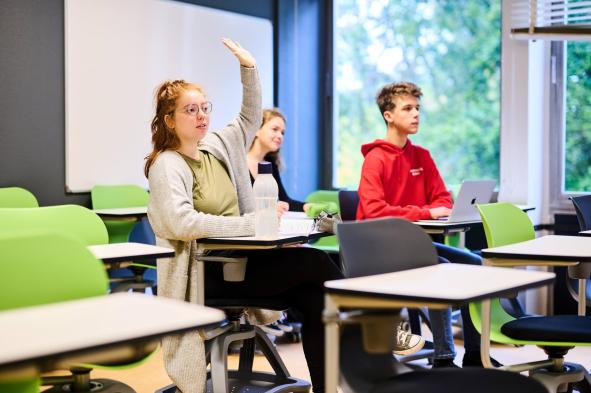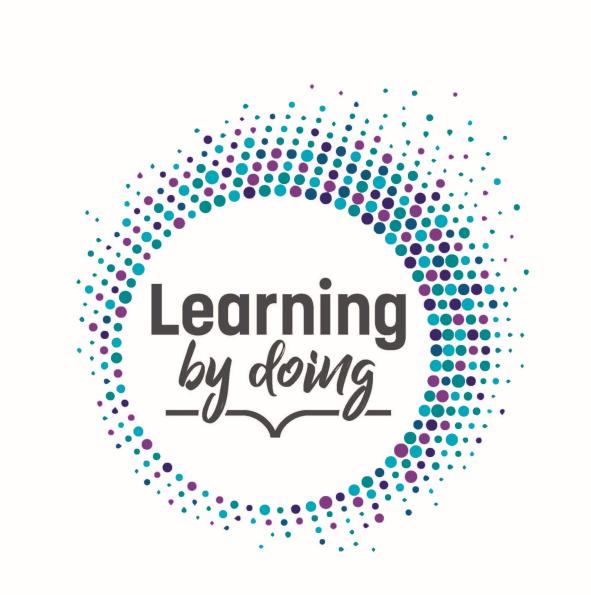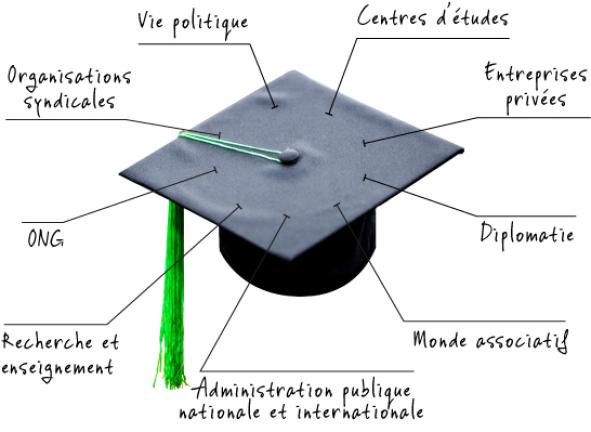Bachelor in Political Sciences : General
-
Schedule
regular course
- ECTS Credits 180

Your bachelor's degree begins with a broad training in human sciences (political economy, law, philosophy, history, sociology, media information) and analytical tools (qualitative methods, statistics and database).
You will learn to master the basics of the four major axes of the discipline: political sociology, analysis of public action, theory and history of political ideas, and international and European relations.
By the second block, you're right at the heart of what makes political science so special! You'll master Belgian politics and power games at national, European and international levels. The international aspect of your training becomes clearer thanks to courses in economic relations, international relations, public law and European institutions, international economic policy... but also thanks to meetings with professionals in the field.
You're off to a good start
- you want to master the mechanisms of how our society works;
- you want to participate directly in the management of our society and its evolution;
- you are passionate about current affairs and political issues at national, European and international levels;
- you have an analytical and critical mind;
- you express yourself fluently orally and in writing and wish to do so in other languages.
Teaching methods
Courses, exercise sessions, project coaching, meetings with industry professionals... everything is done to ensure excellent mastery of concepts and the development of practical skills.

From the outset, you learn to identify political phenomena, search for information, analyze data and propose concrete actions in response to various institutional, economic, social, and diplomatic challenges.
Throughout your training, you develop communication skills, not only in French, but also in two other languages: English and Dutch or German or Spanish. From Block 2 onwards, several courses are taught entirely in English and are based on individual and directed readings, learning the vocabulary of the discipline, group discussion sessions...
During seminars and numerous practical assignments, you meet officials from international institutions, Belgian politicians and representatives of civil society. Thanks to their experiences, you'll take a fresh look at the pillars of political science to become specialists in them.

At the heart of political issues right from the baccalaureate!
Project-based learning crosses and mobilizes your knowledge of several disciplines around concrete cases.
Like true policy experts, you learn to work collaboratively and demonstrate multiple skills:
- from observation, documentary research, source criticism, data collection and analysis;
- to the production of a high-quality report - with, in some cases, a policy brief written in English - which you and your team present before a jury.
To boost your foreign-language communication soft skills, coaching is provided by your language teachers.
Learning by doing pedagogy |
| projects take an increasingly important part in your bachelor's course, through concrete and diversified political science cases: | IN BLOCK 1:
|
IN BLOCK 2:
|
IN BLOCK 3:
|
International experience
At the end of your bachelor's degree, you will have the opportunity to study in France (Université de Montpellier, Université Catholique de Lille...), the Netherlands (Maastricht University), the United States (Creighton University), Spain (Valencia University, Loyola Andalusia University), Italy (Sacred Heart University-Milan, Salerno University) or Germany (Trier University).
Success aids
Succeeding in a year of study at university involves many challenges.
To help you meet them, UNamur supports you in developing your disciplinary, methodological and human skills... with the support of numerous professionals.
Preparatory courses, individualized help...
After the baccalauréat: the master's degree
The bachelor's degree in political science at UNamur gives access to master's degrees at all the universities of the Wallonia-Brussels Federation, such as the master's degree in political science (general orientation or international relations), the master's degree in public administration, or the master's degree in European studies.
But many Université de Namur students decide to pursue their studies at prestigious universities abroad (Sciences Po Paris, King's College London, University of Edinburgh, School of Oriental and African Studies - SOAS, University of Amsterdam....).
-
<unknown>
-
<unknown>
Code Name Staff Th.+Ex. Credits/Block 1 2 3 FINT0027 Historical introduction to the main non-European civilisations ("Arab-Muslim world - Sub-Saharan Africa" module) Franssen Élise Cornet Anne Renard Etienne 45h th. 5 LHISB319 War and Strategy in Late Modern History Tixhon Axel 30h th. 5 ECGEB375 International economic relations De Crombrugghe De Picquendaele Alain 30h th. + 15h ex. 5 -
<unknown>
Code Name Staff Th.+Ex. Credits/Block 1 2 3 EPOLB216 New social and political conflicts Borriello Arthur 30h th. + 15h ex. 5 EPOLB308 Theories of democracy and democratic innovations De Briey Laurent 30h th. + 15h ex. 5 EPOLB309 Ecological governance Jacquet Vincent 30h th. + 15h ex. 5
-
-
<unknown>
Code Name Staff Th.+Ex. Credits/Block 1 2 3 EPICB160 Political Science Dodeigne Jérémy Biard Benjamin Uyttendaele Laura 45h th. + 15h ex. 5 EPOLB118 Introduction to diplomacy Bled Amandine Braspenning Thierry 30h th. + 15h ex. 5 EPOLB260 History of political ideas De Briey Laurent Jäger Anton 30h th. + 15h ex. 5 EPOLB217 Democracies, Populisms and Extremism Borriello Arthur 30h th. + 15h ex. 5 EPOLB317 Public governance 30h th. + 15h ex. 5 LHISB204 Belgian political structures and institutions in contemporary times Dodeigne Jérémy Tixhon Axel Talukder David 45h th. 5 EPOLB362 International Relations Theories Braspenning Thierry 30h th. + 15h ex. 5 Soft skillsEPOLB364 Belgian and comparative policy issues Dodeigne Jérémy Dodeigne Jérémy Versailles Alban Versailles Alban 45h th. + 15h ex. 5 -
<unknown>
Code Name Staff Th.+Ex. Credits/Block 1 2 3 ECGEB130 Foundations of law De Streel Alexandre 45h th. + 15h ex. 5 EPOLB315 History and law of international relations Jouan Quentin Le Hardy De Beaulieu Jean 60h th. 5 DROIB102 Constitutional law Vuye Hendrik 75h th. + 6h ex. 5 DROIB210 EU Institutional law De Streel Alexandre 45h th. 5 -
<unknown>
Code Name Staff Th.+Ex. Credits/Block 1 2 3 ECGEB170 Economic facts and decisions De Crombrugghe De Picquendaele Alain 45h th. + 15h ex. 5 ECGEB270 Macroeconomics Kiedaisch Christian Latzer Hélène 45h th. + 15h ex. 5 EPOLB304 Analysis of (inter)national economic discourse Borriello Arthur Debras Francois 30h th. + 15h ex. 4 -
<unknown>
Code Name Staff Th.+Ex. Credits/Block 1 2 3 ECGEB140 Sociology Rigaux Natalie 45h th. + 15h ex. 5 ECGEB121 Economic and social history Roekens Anne 45h th. + 7.5h ex. 5 ECGEB120 Philosophy De Briey Laurent Ruffo de Bonneval de la Fare des Comtes de Sinopoli de Calabre Marie-Des-Neiges 45h th. + 15h ex. 5 EPICB142 Communication and media literacy Klein Annabelle Haineaux Esther 45h th. + 15h ex. 5 Translated with DeepL.com (free version)Soft skillsECGEB322 Civic engagement Rigaux Natalie Pierre Amélie 15h th. + 30h ex. 4 ECGEB321 Religious Studies Malvaux Paul 30h th. + 15h ex. 4 Translated with DeepL.com (free version)EPICB322 Anthropology Rigaux Natalie Pierre Amélie 30h th. + 30h ex. 5 -
<unknown>
Code Name Staff Th.+Ex. Credits/Block 1 2 3 ECGEB110 Information Systems I: Introduction and Modelling Verlaine Bertrand 30h th. + 15h ex. 4 EPOLB214 Criticism of information sources Collard Anne-Sophie Haineaux Esther 30h th. + 15h ex. 5 EPICB154 Statistics for the humanities I Kiriliouk Anna Kiriliouk Anna Bugli Céline Bugli Céline 30h th. + 15h ex. 5 EPICB225 Statistics for the social sciences Van Bever Germain Boucher Maxime 15h th. + 30h ex. 5 -
<unknown>
Code Name Staff Th.+Ex. Credits/Block 1 2 3 EPICB131 Project: Deciphering political communication Klein Annabelle Borriello Arthur Latiers Mélanie Borriello Arthur 37.5h th. + 30h ex. 5 EPOLB221 Research Project : Policy-making in transforming societies Pennetreau Damien Burnay Nathalie Pierre Amélie 75h th. + 15h ex. 10 Soft skillsEPOLB322 Project : European Integration. Learning Theories in Negotiation Role-plays Dodeigne Jérémy Borriello Arthur Randour François Santos Nelson 60h th. + 50h ex. 10 -
<unknown>
Code Name Staff Th.+Ex. Credits/Block 1 2 3 Soft skillsEELVB190 Anglais 1 (niveau B1+) Dupal Jérémie Bulon Amélie 30h th. 3 EELVB390 English 3 (level B2) Foissac Patrick Hoorelbeke Christelle 30h th. 3 EELVB290 English 2 (level B1+ or higher) Hoorelbeke Christelle 30h th. 3 -
<unknown>
Code Name Staff Th.+Ex. Credits/Block 1 2 3 EELVB196 Spanish 1 (minimum level A2) Marsily Aurélie 30h th. 3 EELVB296 Español 2 (nivel B1 o superior) Marsily Aurélie 30h th. 3 EELVB396 Español 3 (nivel B1+ o superior) Marsily Aurélie 30h th. 3 -
<unknown>
Code Name Staff Th.+Ex. Credits/Block 1 2 3 EELVB192 German 1 (minimum level A2) Vanoirbeek Fabienne 30h th. 3 EELVB292 Deutsch 2 (Level B1) Vanoirbeek Fabienne 30h th. 3 EELVB392 Deutsch 3 (mindestens level B1+) Vanoirbeek Fabienne 30h th. 3 -
<unknown>
-
<unknown>
Code Name Staff Th.+Ex. Credits/Block 1 2 3 EELVB181 Kritische benadering van socio-economische onderwerpen Naveau Sophie 30h th. 3 EELVB281 De Vlaamse/Nederlandse bedrijfswereld - interculturaliteit Miceli Marc 30h th. 3 EELVB381 Bedrijfscommunicatie en sollicitatiegesprekken – B2 Hoorelbeke Christelle 30h th. 3 -
<unknown>
Code Name Staff Th.+Ex. Credits/Block 1 2 3 EELVB191 Elementair Nederlands: basisgrammatica, -woordenschat en dagelijkse situaties Miceli Marc Naveau Sophie 30h th. 3 EELVB291 Mondelinge en schriftelijke communicatie in het alledaagse Nederlands Naveau Sophie 30h th. 3 EELVB391 Mondelinge en schriftelijke communicatie op de werkvloer -B1 Miceli Marc Hoorelbeke Christelle 30h th. 3
-
-
-
<unknown>
Code Name Staff Credits Hours/Quarter 1 2 EPICB160 Political Science Dodeigne Jérémy Biard Benjamin Uyttendaele Laura 5 45h th. + 15h ex. EPOLB118 Introduction to diplomacy Bled Amandine Braspenning Thierry 5 30h th. + 15h ex. -
<unknown>
Code Name Staff Credits Hours/Quarter 1 2 ECGEB130 Foundations of law De Streel Alexandre 5 45h th. + 15h ex. -
<unknown>
Code Name Staff Credits Hours/Quarter 1 2 ECGEB170 Economic facts and decisions De Crombrugghe De Picquendaele Alain 5 45h th. + 15h ex. -
<unknown>
Code Name Staff Credits Hours/Quarter 1 2 ECGEB140 Sociology Rigaux Natalie 5 45h th. + 15h ex. ECGEB121 Economic and social history Roekens Anne 5 45h th. + 7.5h ex. ECGEB120 Philosophy De Briey Laurent Ruffo de Bonneval de la Fare des Comtes de Sinopoli de Calabre Marie-Des-Neiges 5 45h th. + 15h ex. EPICB142 Communication and media literacy Klein Annabelle Haineaux Esther 5 45h th. + 15h ex. -
<unknown>
Code Name Staff Credits Hours/Quarter 1 2 ECGEB110 Information Systems I: Introduction and Modelling Verlaine Bertrand 4 30h th. + 15h ex. EPICB154 Statistics for the humanities I Kiriliouk Anna Kiriliouk Anna Bugli Céline Bugli Céline 5 30h th. + 15h ex. -
<unknown>
Code Name Staff Credits Hours/Quarter 1 2 EPICB131 Project: Deciphering political communication Klein Annabelle Borriello Arthur Latiers Mélanie Borriello Arthur 5 37.5h th. + 30h ex. -
<unknown>
Code Name Staff Credits Hours/Quarter 1 2 Soft skillsEELVB190 Anglais 1 (niveau B1+) Dupal Jérémie Bulon Amélie 3 20h th. 10h th. -
<unknown>
Code Name Staff Credits Hours/Quarter 1 2 EELVB196 Spanish 1 (minimum level A2) Marsily Aurélie 3 15h th. 15h th. -
<unknown>
Code Name Staff Credits Hours/Quarter 1 2 EELVB192 German 1 (minimum level A2) Vanoirbeek Fabienne 3 15h th. 15h th. -
<unknown>
-
<unknown>
Code Name Staff Credits Hours/Quarter 1 2 EELVB181 Kritische benadering van socio-economische onderwerpen Naveau Sophie 3 15h th. 15h th. -
<unknown>
Code Name Staff Credits Hours/Quarter 1 2 EELVB191 Elementair Nederlands: basisgrammatica, -woordenschat en dagelijkse situaties Miceli Marc Naveau Sophie 3 15h th. 15h th.
-
-
-
<unknown>
-
<unknown>
Code Name Staff Credits Hours/Quarter 1 2 FINT0027 Historical introduction to the main non-European civilisations ("Arab-Muslim world - Sub-Saharan Africa" module) Franssen Élise Cornet Anne Renard Etienne 5 22.5h th. 22.5h th. -
<unknown>
Code Name Staff Credits Hours/Quarter 1 2 EPOLB216 New social and political conflicts Borriello Arthur 5 30h th. + 15h ex.
-
-
<unknown>
Code Name Staff Credits Hours/Quarter 1 2 EPOLB260 History of political ideas De Briey Laurent Jäger Anton 5 30h th. + 15h ex. EPOLB217 Democracies, Populisms and Extremism Borriello Arthur 5 30h th. + 15h ex. LHISB204 Belgian political structures and institutions in contemporary times Dodeigne Jérémy Tixhon Axel Talukder David 5 45h th. -
<unknown>
Code Name Staff Credits Hours/Quarter 1 2 DROIB102 Constitutional law Vuye Hendrik 5 38h th. + 3h ex. 37h th. + 3h ex. -
<unknown>
Code Name Staff Credits Hours/Quarter 1 2 ECGEB270 Macroeconomics Kiedaisch Christian Latzer Hélène 5 45h th. + 15h ex. -
<unknown>
Code Name Staff Credits Hours/Quarter 1 2 Translated with DeepL.com (free version)Soft skillsECGEB322 Civic engagement Rigaux Natalie Pierre Amélie 4 15h th. + 30h ex. ECGEB321 Religious Studies Malvaux Paul 4 30h th. + 15h ex. -
<unknown>
Code Name Staff Credits Hours/Quarter 1 2 EPOLB214 Criticism of information sources Collard Anne-Sophie Haineaux Esther 5 30h th. + 15h ex. EPICB225 Statistics for the social sciences Van Bever Germain Boucher Maxime 5 15h th. + 30h ex. -
<unknown>
Code Name Staff Credits Hours/Quarter 1 2 EPOLB221 Research Project : Policy-making in transforming societies Pennetreau Damien Burnay Nathalie Pierre Amélie 10 45h th. + 7h ex. 30h th. + 8h ex. -
<unknown>
Code Name Staff Credits Hours/Quarter 1 2 EELVB290 English 2 (level B1+ or higher) Hoorelbeke Christelle 3 30h th. -
<unknown>
Code Name Staff Credits Hours/Quarter 1 2 EELVB296 Español 2 (nivel B1 o superior) Marsily Aurélie 3 15h th. 15h th. -
<unknown>
Code Name Staff Credits Hours/Quarter 1 2 EELVB292 Deutsch 2 (Level B1) Vanoirbeek Fabienne 3 15h th. 15h th. -
<unknown>
-
<unknown>
Code Name Staff Credits Hours/Quarter 1 2 EELVB281 De Vlaamse/Nederlandse bedrijfswereld - interculturaliteit Miceli Marc 3 15h th. 15h th. -
<unknown>
Code Name Staff Credits Hours/Quarter 1 2 EELVB291 Mondelinge en schriftelijke communicatie in het alledaagse Nederlands Naveau Sophie 3 15h th. 15h th.
-
-
-
<unknown>
-
<unknown>
Code Name Staff Credits Hours/Quarter 1 2 LHISB319 War and Strategy in Late Modern History Tixhon Axel 5 30h th. ECGEB375 International economic relations De Crombrugghe De Picquendaele Alain 5 30h th. + 15h ex. -
<unknown>
Code Name Staff Credits Hours/Quarter 1 2 EPOLB308 Theories of democracy and democratic innovations De Briey Laurent 5 30h th. + 15h ex. EPOLB309 Ecological governance Jacquet Vincent 5 30h th. + 15h ex.
-
-
<unknown>
Code Name Staff Credits Hours/Quarter 1 2 EPOLB317 Public governance 5 30h th. + 15h ex. EPOLB362 International Relations Theories Braspenning Thierry 5 30h th. + 15h ex. Soft skillsEPOLB364 Belgian and comparative policy issues Dodeigne Jérémy Dodeigne Jérémy Versailles Alban Versailles Alban 5 45h th. + 15h ex. -
<unknown>
Code Name Staff Credits Hours/Quarter 1 2 EPOLB315 History and law of international relations Jouan Quentin Le Hardy De Beaulieu Jean 5 60h th. DROIB210 EU Institutional law De Streel Alexandre 5 45h th. -
<unknown>
Code Name Staff Credits Hours/Quarter 1 2 EPOLB304 Analysis of (inter)national economic discourse Borriello Arthur Debras Francois 4 30h th. + 15h ex. -
<unknown>
Code Name Staff Credits Hours/Quarter 1 2 Translated with DeepL.com (free version)EPICB322 Anthropology Rigaux Natalie Pierre Amélie 5 30h th. + 30h ex. -
<unknown>
Code Name Staff Credits Hours/Quarter 1 2 Soft skillsEPOLB322 Project : European Integration. Learning Theories in Negotiation Role-plays Dodeigne Jérémy Borriello Arthur Randour François Santos Nelson 10 30h th. + 20h ex. 30h th. + 30h ex. -
<unknown>
Code Name Staff Credits Hours/Quarter 1 2 EELVB390 English 3 (level B2) Foissac Patrick Hoorelbeke Christelle 3 30h th. -
<unknown>
Code Name Staff Credits Hours/Quarter 1 2 EELVB396 Español 3 (nivel B1+ o superior) Marsily Aurélie 3 15h th. 15h th. -
<unknown>
Code Name Staff Credits Hours/Quarter 1 2 EELVB392 Deutsch 3 (mindestens level B1+) Vanoirbeek Fabienne 3 15h th. 15h th. -
<unknown>
-
<unknown>
Code Name Staff Credits Hours/Quarter 1 2 EELVB381 Bedrijfscommunicatie en sollicitatiegesprekken – B2 Hoorelbeke Christelle 3 15h th. 15h th. -
<unknown>
Code Name Staff Credits Hours/Quarter 1 2 EELVB391 Mondelinge en schriftelijke communicatie op de werkvloer -B1 Miceli Marc Hoorelbeke Christelle 3 15h th. 15h th.
-
-
Les métiers essentiels pour les grands défis de demain

Essential professions for tomorrow's major challenges
Power, power and decisions
As political scientists, you master the principles through which society is structured.
Experts in understanding the mechanisms of power and political, economic and social life, you unravel the secrets and stakes of public action on the local, regional, national and international scene.
The history of democracy, liberalism and nationalism, as well as your knowledge of economics, law, history and philosophy, enable you to take a critical look at today's society. This unique ability to cross viewpoints sets you apart and places you among the players best prepared to understand and help the world we live in evolve.
Political life
Graduates play an active role in political life within ministerial cabinets, political parties, trade unions, parliamentary groups... They follow debates and prepare in-depth dossiers on specific issues for elected representatives.
National and international public administration
Whatever the level of power (federal, community, regional, provincial or communal), political scientists are apt to manage day-to-day affairs in all public services (health, interior, finance, education, foreign affairs...).
Many graduates dream of working for an international organization (European Union, NATO, FAO...). Competitive examinations and national quotas limit job opportunities in this sector. Nevertheless, most of these institutions offer internships to young graduates, which can, in some cases, increase the chances of landing a job there as a contract worker.

Associative world
From neighborhood committees to development aid organizations in the broadest sense, there are many associations where political science graduates can put themselves at the service of public affairs. There, they perform research, decision-making or management functions.
Other sectors
Political scientists can work in the media or become spokespersons for political organizations, provided, of course, that they demonstrate specific personal aptitudes, or even benefit from additional training. Large private companies (banks, consultancies...) appreciate the international outlook of certain political scientists, to whom they entrust missions where links with foreign countries are now crucial.
Key players in society
Capable of using legal, sociological, political and economic knowledge to develop a coherent narrative on a given subject, political scientists have a wide sphere of professional action. When it comes to landing a first job, in addition to mastery of analytical methods (qualitative and quantitative), proficiency in languages and a wealth of commitment, particularly in the associative world, will often be decisive.
Architects of public action
Political science students share a strong sense of public interest, both locally and globally. Indeed, it's to encourage this openness to the world that UNamur offers students in this field the chance to take an Erasmus trip as early as the third bachelor's block.
Changing society requires an understanding of its innermost workings. At the end of their training, political scientists master the workings of Belgian and/or international institutions, as well as the economics and management of public affairs. They are prepared to draw up action programs, both realistic and respectful of constraints, in response to increasingly complex societal problems.
Studies in political science also develop the ability to communicate in French and foreign languages. Political scientists must be able to explain what they do and rigorously defend the results of their action.